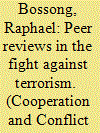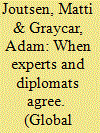| Srl | Item |
| 1 |
ID:
167399


|
|
|
|
|
| Summary/Abstract |
This article conducts a comparative analysis of peer and public pressure in peer reviews among states. Arguing that such pressure is one increasingly important form of shaming in global politics, we seek to understand the extent to which five different peer reviews exert peer and public pressure and how possible variation among them can be explained. Our findings are based on responses to an original survey and semi-structured interviews among participants in the reviews. We find that peer and public pressure exist to different degrees in the peer reviews under study. Such differences cannot be explained by the policy area under review or the international organization in which peer reviews are organized. Likewise, the expertise of the actors involved in a peer review or perceptions of the legitimacy of peer review as a monitoring instrument do not explain the variation. Instead, we find that institutional factors and the acceptance of peer and public pressure among the participants in a peer review offer the best explanations.
|
|
|
|
|
|
|
|
|
|
|
|
|
|
|
|
| 2 |
ID:
179327


|
|
|
|
|
| Summary/Abstract |
How can we make sure that states do not only sign international anti-corruption conventions, but also comply with them once the ink has dried? Peer review among states offers one answer to this question. This article develops a theoretical framework to study the different processes and mechanisms through which peer reviews can contribute to state compliance. It focuses on three processes: transparency, pressure, and learning. The article subsequently applies this framework to the OECD Working Group on Bribery (WGB) in order to identify how far participants in this peer review perceive the WGB as capable of organising these processes, and to what extent they consider these processes relevant for promoting state compliance. Data come from an online survey (74 observations) and 17 in-depth interviews. The findings reveal that this peer review exercise is perceived as effective in creating transparency about state behaviour, mobilising pressure, and stimulating learning. However, the extent to which these processes can promote compliance is more limited. For these processes to work, political will is crucial.
|
|
|
|
|
|
|
|
|
|
|
|
|
|
|
|
| 3 |
ID:
116686


|
|
|
|
|
| Publication |
2012.
|
| Summary/Abstract |
This article analyses EU peer reviews in the fight against terrorism, which constitute a significant and previously unstudied instrument of European security governance. The first part reviews some general features of security governance and outlines two analytical perspectives to assess the effect of peer reviews in this context, namely compliance and learning. The second part surveys the historical development and substantive impact of the EU's peer reviews on the fight against terrorism. Although the first peer review after the attacks of 9/11 was slow to unfold, it eventually came to be regarded as a highly successful exercise that improved mutual trust and the coherence of the European fight against terrorism. It was therefore followed by a second peer review on consequence management in response to terrorist attacks. From a critical perspective, the article argues that the impact of these peer reviews could be doubted from both compliance and learning perspectives, as monitoring and flanking measures have remained too weak. The conclusions raise further avenues for research on peer reviews that are a regular feature of EU security governance.
|
|
|
|
|
|
|
|
|
|
|
|
|
|
|
|
| 4 |
ID:
177237


|
|
|
|
|
| Summary/Abstract |
The traditional process of peer review and publication has come under intense scrutiny in recent years. The time seems propitious for a consideration of alternatives in political science. To that end, we propose a Peer Review and Publication Consortium. The Consortium retains the virtues of the traditional peer-review process (governed by academic journals) while also mitigating some of its vices.
|
|
|
|
|
|
|
|
|
|
|
|
|
|
|
|
| 5 |
ID:
149110


|
|
|
|
|
| Summary/Abstract |
What is the main motivation for replication in international relations? How can we implement it, and who is in charge? With a variety of proposals put forward by the contributors to this special issue, it seems useful to provide a synopsis. This article does so by asking a set of key questions related to replication, and by summarizing the stance each proposal takes with respect to these questions. This comparison reveals that there are fewer disagreements than we would think: there is broad consensus when it comes to the motivation and the need for replication in our field. However, proposals diverge as to how replication should be best implemented and, to a lesser extent, who should be the driving force behind this. This article concludes with a recommendation for a dual strategy. First, simple replication on the journal side should be implemented as a routine quality check to weed out work that does not even satisfy basic replication standards. Second, journals should be encouraged to allow publication of more comprehensive, in-depth replication studies with an independent contribution.
|
|
|
|
|
|
|
|
|
|
|
|
|
|
|
|
| 6 |
ID:
117797


|
|
|
|
|
| Publication |
2012.
|
| Summary/Abstract |
The UN Convention Against Corruption is the only truly global convention in corruption control. Separate and rather difficult negotiations were conducted on a mechanism for the implementation of the treaty. These negotiations broke ground by providing, for the first time, peer review of a United Nations treaty. This article, which is based on the authors' close observations and interviews with key participants, seeks to show how the dynamics between technical experts and diplomats led to a resolution that would not have occurred if either the technical experts or the diplomats had acted alone.
|
|
|
|
|
|
|
|
|
|
|
|
|
|
|
|